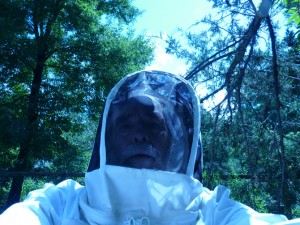Beltane Early Growth Moon
An odd twist in emphasis in the usually technological triumphalist (which I enjoy, even if I don’t always agree with it) Wired Magazine: a sensible article on cancer, one that illustrates modesty in the face of evolution and the dangers of metaphor.
Cellular multiplication and cellular death occur over and over again in the human body from the moment of birth onward. (before birth, too? don’t know) As cells multiply, necessary to keep replacing the cells that die, mutations creep in. Cells have elaborate defenses against mutations that bloom into their own activity program–cancer and these work well, as the Wired article points out, most of the time.
But, two factors work against the body’s defenses: the first is the sheer number of mutations that occur in a lifetime, live long enough and one or two will sneak past the cells defenses, the second I snuck in the last part of that phrase, time. The longer we live, that is, the more successful we are pushing back disease, certain cancers, too, the more time we have to acquire new mutations that a weakened cellular defense system cannot handle.
Here’s where the Wired article goes radical. Cancer, it says, is not a bad actor, it is, simply, the bodies on agents acting without proper restraint. And, given the two factors mentioned in the above paragraph, it must be seen as a normal part of the aging process. Cancer, then, is not an enemy, but friendly fire.
This matters. And here we get into the power of language and metaphor. Remember Nixon’s War on Cancer? Well, guess what? Cancer won. Yes, we’ve developed many treatments that fend off this cancerous assault or another, but in this understanding, all we’ve done is delayed, not defeated cancer.
When we go to war against our body, we end up with the dire consequences of chemotherapy. All along here, I’ve been thinking about Regina Schmidt, Bill Schmidt’s wife, who died of complication relating to cancer treatment. She refused to see the cancer as an enemy that she needed to fight. She did engage in a battle with her cancer.
Yes, she used the tools available to slow it down, stave it off, but when the tools began to overwhelm her as well, she decided to not use them anymore. This is not the kind of decision you make in a war; it’s the kind of decision you make in a life.
And that’s exactly where the war metaphor gets us in trouble with cancer. We feel like if we don’t battle valiantly with all the weapons deployed, never mind the battlefield, we’ve admitted defeat.
No. We admit to being human. To having a body that cannot defend us forever. To having cells that mostly, in fact, almost perfectly, recreate us every seven years or so with no major problems, but which eventually face odds they cannot overcome. That’s not war; it’s time and fate.
We know the dangers of metaphor, those of us have lived through the reaction to 9/11. Bush invoked the war metaphor and trillions of dollars, thousands of lives and a wasted international reputation later, we’re still fighting. How much more sensible if we recognized terrorism as a mutation of the body human, not compatible with life, but not something we need to go to war against either; treating it rather as a cell treats a rogue cell, with localized defenses, something more resembling law enforcement than military engagement.
Words matter; lives matter. Let’s not waste either one.

 maybe enough to get them through to the dandelions.
maybe enough to get them through to the dandelions.